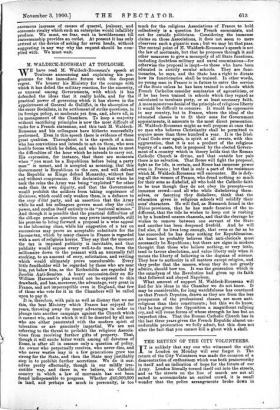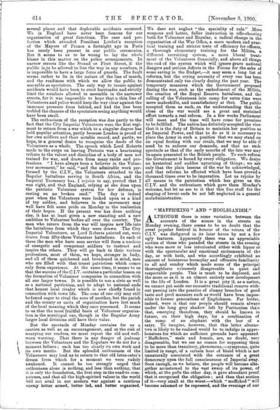THE RETURN OF THE CITY VOLUNTEERS.
IT is unlikely that any one who witnessed the sight in London on Monday will ever forget it. The return of the City Volunteers was made the occasion of a demonstration of enthusiasm which was both praiseworthy in itself and an indication of hope for the future of our Army. London literally turned itself out into the streets, and as the streets on the line of march are not all suited to accommodate an excited crowd, it is small wonder that the police arrangements broke down in several places and that deplorable accidents occurred. We in England have never been famous for our organisation of great functions. The ease and per- fection which attended President Loubet's reception of the Mayors of France a fortnight ago in Paris has rarely been present in our public ceremonies.
But it seems to us to be wrong to lay the whole blame in this matter on the police arrangements. In narrow streets like the Strand or Fleet Street, if the public is.to be allowed to line the way in any numbers, it is impossible to have a large force of guards. The fault seems rather to lie in the nature of the line of march, and the readiness with which we allow the public to assemble as spectators. The only way to insure against accidents would have been to erect barricades and strictly limit the numbers allowed to assemble in the narrower streets, for it was impossible to hope that a thin line of Volunteers and police would keep the way clear against the immense pressure from behind, and had the line been trebled the chances of the spectators seeing anything would have been small.
The enthusiasm of the reception was due partly to the fact that the City Imperial Volunteers were the first regi- ment to return from a war which to a singular degree has held popular attention, partly because London is proud of her own soldiers and their notable record, and partly, we hope, to a general desire to recognise the deeds of the Volunteers as a whole. The speech which Lord Roberts made to the corps on leaving Pretoria was a heartening tribute to the valour and discipline of a body of men not trained for war, and drawn from many ranks and pro- fessions. "I have always been a believer in the Volun- teer movement," he said, "and the admirable work per- formed by the C.I.V., the Volunteers attached to the Regular battalions serving in South Africa, and the Imperial Yeomanry has, I rejoice to say, proved that I was right, and that England, relying as she does upon thepatriotic Volunteer system for her defence, is resting on no broken reed." The day is indeed past when the Volunteers were looked upon as a kind of toy soldier, and believers in the movement may well have felt some pride on Monday in the realisation of their hopes. If the present war has done nothing else, it has at least given a new standing and a new ambition to Volunteer bodies all over the country. The men who return from the war will inspire new life into the battalions from which they were drawn. The City Imperial Volunteers, as Lord Roberts pointed out, were drawn from fifty-three Volunteer battalions. In each of these the men who have seen service will form a nucleus of energetic and competent soldiers to instruct and inspire the others. They will go back to their various professions, most of them, we hope, stronger in body, and all of them quickened and broadened in mind, men who are filled with that truest patriotism which comes only from experience. At the same time, it seems to us that the success of the C.I.V. contains a particular lesson on the formation of Volunteer companies in connection with all our larger towns. It is possible to use a civic as well as a national patriotism, and to adapt to national ends that honest local rivalry which is now chiefly found in connection with town life. The sons of one city may still be found eager to rival the sons of another, but the parish and the county as units of organisation have lost much of the local meaning which they once possessed. It seems to us that the most fruitful basis of Volunteer organisa- tion is the municipal one, though in the Regular Army larger local divisions still have their value.
But the spectacle of Monday contains for us a caution as well as an encouragement, and at the risk of wearying our readers, we must repeat the old and well- worn warning. That there is any danger of jealousy between the Volunteers and the Regulars we do not for a moment believe ; each has too clearly its own work and its own merits. But the splendid enthusiasm of the Volunteers may lead us to return to that old lotus-eater's dream from which for a moment we were rudely awakened. It cannot be too strongly urged that enthusiasm alone is nothing, and less than nothing, that it is only the foundation, the first step in the road•to com- petence, and that all the high-spirited valour in the world will not avail in our modern war against a cautious enemy better armed, better led, and better organised. We dare not neglect "the speciality of rule." Mom weapons and better, fuller instruction in rifle-shooting both for Volunteer and Repailar, a radical change in the organisation of the War Office, a more modern and-prac- tical training and stricter tests of efficiency for officers, a thorough elementary training for the Militia, a different recruiting system, a more liberal treat- ment of the Volunteers financially, and above all things the end of the system which will ignore grave national dangers and serious defects in the Forces for the sake of some saving in the Budget,—it may seem a long list of reforms, but the crying necessity of every one has been demonstrated only too clearly during the past year. The temporary measures which the Government proposed during the war, such as the embodiment of the Militia, the creation of the Royal Reserve battalions, and the calling of the Volunteers into camp for extra time were mere makeshifts, and unsatisfactory at that. The public accepted them as such, on the understanding that the close of the war would see a great and sustained effort towards a real reform. In a few weeks Parliament will meet and the time will have come for promises to be fulfilled. The nation has definitely accepted the view that it is the duty of Britain to maintain her position as an Imperial Power, and that to do so it is necessary to place the Army in such a position that we may stand on an equal footing with our rivals, that we may be able if need be to enforce our demands, and that no such spectacle as that of the early months of the late war may be again presented to the British people. To such reform the Government is bound by every obligation. We desire no hysterical and sudden upturning of things ; we ask only that the plain lessons of the war be acknowledged, and that reforms be effected which have been proved a thousand times over to be imperative. Let us rejoice by all means in the patriotism which has given us the C.I.V. and the enthusiasm which gave them Monday's welcome, but let us see to it that this fine stuff for the shaping of heroic ends be not left neglected in a general maladministration.























































 Previous page
Previous page